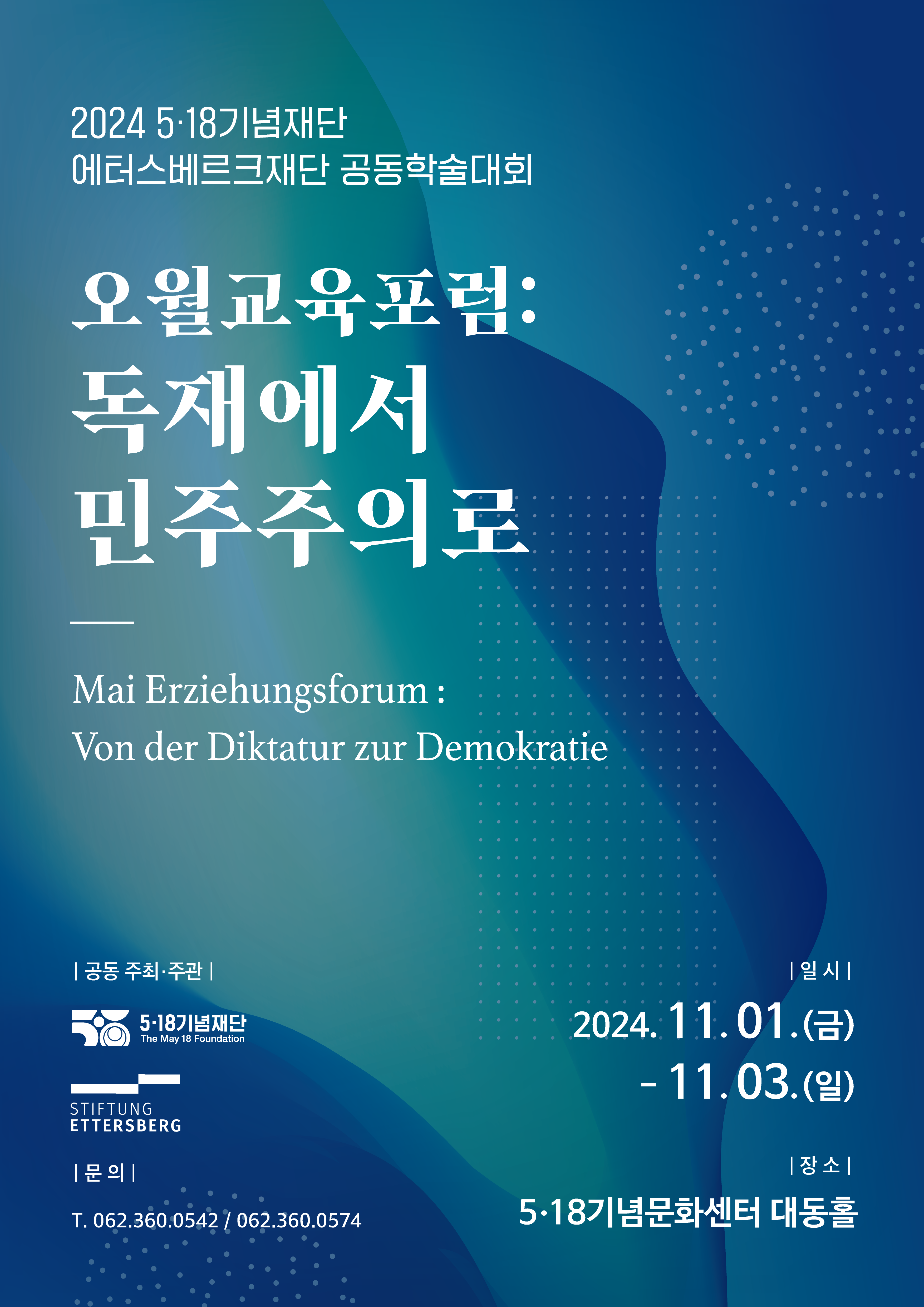for Global Citizens and Researchers
Participation & Communication
News
[Press Release] [Press Release 2024-86] May 18 Memorial Foundation - Ettersberg Foundation Joint Academic Conference “May Education Forum: From Dictatorship to Democracy”
- 작성자
- 서브관리자
- 작성일
- 2024-10-28
- 조회 수
- 418회

May 18 Memorial Foundation - Ettersberg Foundation Joint Conference “From Dictatorship to Democracy” - Remembering State Violence and Civil Revolutions in Gwangju , Leipzig, and Kiev
On November 1, the May 18 Memorial Foundation will host a joint conference with the Ettersberg Foundation in Germany. Under the theme “From Dictatorship to Democracy,” the conference will analyze the ways in which state violence and civil revolutions are remembered in Gwangju, Leipzig, and Kiev, as well as their parallels.
In the keynote session starting at 1:00 p.m., Hettling, Manfred, a historian at Martin Luther University, will explore how the interplay between state violence and civil resistance shapes flows of memory and commemoration. His presentation will compare the pro-democracy movements in Leipzig and Kiev and the May 18th uprising in Gwangju in the historical and cultural context of each city.
Following the keynote, Hausmann, Guido, a historian at the University of Regensburg, will analyze the historical context of the 2014 Maidan protests and the political changes that resulted from them. Guido will point out that the establishment of memorials and museums in areas of pro-democracy movements can play a symbolic role in reinforcing a country's historical identity and local solidarity, but is often not realized for various political reasons.
The second presentation, by Dr. Jörg Ganzenmüller, President of the Ettersberg Foundation, will address the challenges facing memory in the modern world. He will take the opportunity to reflect on contemporary forms of commemoration, pointing out how large-scale memorials, commemorations, and protests often fail or become controversial. The limitations of current memorials and museums in Germany, which do not adequately convey the history of the period or fulfill the role they are supposed to play in a contemporary way, will be conveyed to the citizens of Gwangju.
In the final plenary presentation, Jung Yoon Jung, a historian at Martin Luther University, will emphasize the authenticity of mourning for the victims in the context of commemorative practices derived from the democratization movement. By distinguishing between different periods of history and narratives, she analyzes how pro-democracy movements are objectified depending on the political context.
Following the keynote session and the presentations, a roundtable moderated by Prof. Kim Hyung-joo (May 18 Research Institute, Chonnam National University) will feature designated discussions by Prof. Jung Yong-sook (Department of Social Science Education, Chuncheon National University of Education) and Prof. Kim Tae-hyun (Graduate School of Information and Archives, Hankuk University of Foreign Studies).
The following day, on November 2, at 10 a.m., the session on memory and education, “May 18 Education, Connecting the Past, Present, and Future,” will be moderated by Prof. Sihyun Ryu (Department of Social Science Education, Gwangju National University of Education).
The first presentation will be a retrospective and outlook of the May 18 Education Project by Mr. Lim Kwang-ho, a teacher at Gwangju Electronics High School, who will reflect on the past achievements of the project, share the current educational projects, and prepare for the future. He will summarize the foundation's educational projects over the past 25 years to reveal the rationale behind the youth education project, summarize the history of the youth education project in terms of the operating entity and current status, and discuss the outlook of the May 18 Memorial Foundation's educational projects, including the direction of the youth education project in the future.
In the second presentation, Minsoo Kim from Pusan National University examines the discourse, direction, and limitations of public education on May 18, focusing on textbooks. He argues that there are not enough hours to teach specific modern history in the current curriculum and suggests that the next curriculum should ensure sufficient hours for learning modern history.
In the third presentation, Kim Young-ju, a teacher at Gwangju First High School, shares her first-hand experience of May 18 education at her school and calls for the need for a continuous May 18 discourse community.
In the fourth presentation, Baek Seong-dong, head of the Gwangju branch of the National Teachers' Labor Union, reflects on the current state of May Day education and considers the way forward by sharing her experiences with teachers she met during her visits to historical sites, textbook classes, teacher training, and participation in the 5-18 Memorial Foundation's education projects. We will share the voices of various educational sites and explore the direction of education by comparing it with the German case.
The next session, “Exhibition and Education at the Ettersberg Foundation and Leipzig,” will be moderated by Professor Ho-Keun Choi (Department of History, Korea University). Focusing on the German case, the session will discuss exhibitions and education as contemporary ways to perpetuate memory and commemoration.
The Ettersberg Foundation is a memorial and research foundation founded in 2002 by Spanish writer and Buchenwald concentration camp survivor Jorge Semprun. The Foundation continues to organize joint academic conferences with leading institutions and serves as an international academic platform for the study of the May 18th Democratic Movement and the issues of “freedom and justice” and “democracy, human rights, and peace” in the international community.

 Facebook
Facebook
 Blog
Blog
 Twitter(X)
Twitter(X)